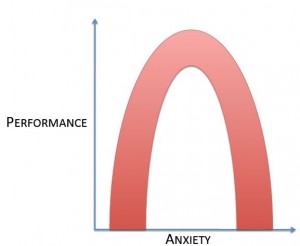One thing that’s been programmed into the world of sports is the idea of “clutch,” that some players perform better under pressure than others. It exists, absolutely, but whether or not it’s impact is properly weighed is another topic for another time. There is no better example of an athlete handling stress and anxiety than Mariano Rivera, who always appears in control and never seems to change his demeanor. When you watch him, you’re unable to tell if it’s a one run playoff game or the third inning of a meaningless Spring Training game.
 In a guest post at THT, Dr. Rob Dobrenksi – a licensed Psychologist in NYC and Shrink Talk author – wrote about anxiety and the different ways it can affect a player’s performance. The basic idea is that anxiety is actually beneficial to a player’s performance because the adrenaline rush gives them “an edge,” as he calls it. However, every player has a point where too much anxiety is detrimental to their performance. Think of the anxiety-performance relationship as a upside-down U-shaped curve, like the one in the graph from the THT article to the left. For some players, like Mo, the peak of their U-curve is way to the right. For others, it’s closer to the left.
In a guest post at THT, Dr. Rob Dobrenksi – a licensed Psychologist in NYC and Shrink Talk author – wrote about anxiety and the different ways it can affect a player’s performance. The basic idea is that anxiety is actually beneficial to a player’s performance because the adrenaline rush gives them “an edge,” as he calls it. However, every player has a point where too much anxiety is detrimental to their performance. Think of the anxiety-performance relationship as a upside-down U-shaped curve, like the one in the graph from the THT article to the left. For some players, like Mo, the peak of their U-curve is way to the right. For others, it’s closer to the left.
Dr. Dobrenski mentions that there are three main components of anxiety, one of which is the inner monologue we all engage in. “If I don’t drive in this run, I’ll be the goat and probably be on the bench tomorrow” is an example. People and athletes are taught to “monitor and challenge” their inner monologue, which admittedly is easier said than done. Instead of worrying about being the goat, they’re taught to think “I can do this, and if I don’t, it won’t be the end of the world,” especially when it comes to something we’ve done countless times before, like Chuck Knoblauch throwing the ball to first.
Alex Rodriguez is perhaps the biggest poster boy for failing under pressure. That is, until this past October of course. Perhaps the peak of his U-curve was well on the left of the graph until he dealt with his PED demons and took some of the weight off his shoulders, shifting his U-curve to the right. I’m no doctor, athough I do play one on a blog, and I’m willing to bet your ability to deal with stress is greatly affected by a whatever else is going on in your life. In fact, I know it is.
The bottom line is that stress and anxiety are completely normal human emotions. We’ve all been stressed out at work, and it certainly effects how we perform, one way or the other. Baseball players are no different, it’s just that their performance under stress is subject to far more public scrutiny. Some anxiety is good for performance, but too much is a problem, no matter who you are.
Leave a Reply
You must be logged in to post a comment.